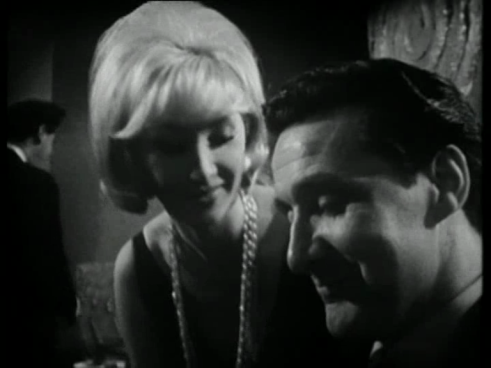A Chorus of Frogs (Episode 02-24, March 1963)
A Chorus of Frogs is the final Venus Smith episode to air, and actually manages to be my favorite of her six entries into The Avengers canon.
Steed has gone on holiday to Greece, but the mysterious death of a diver/spy interrupts his enjoyment of the sea and sand. So Steed hops onto millionaire Mason’s (Eric Pohlman) yacht, the site of the man’s death and the location of his three fellow “Frogs,” a team of smugglers/divers/spies. Venus Smith just so happens to be providing entertainment for the cruise around the Mediterranean – but she’s none too happy when Steed puts in his appearance in her cabin, insisting that he be allowed to sleep there. All is not well on the boat, of course – the death of another diver complicates matters, as does the presence of Anna Lee (Yvonne Shima), apparently a Chinese operative. Meanwhile, Venus appears to have finally gotten fed up with Steed’s insinuation into her life, and just about gives him up as a stowaway when the excitement gets the better of her.
A Chorus of Frogs moves along at a good pace. The plot is somewhat sparse, but what it lacks in narrative sense it makes up for in characterization. Peppered with excellent character actors, including John Carson as the diver Ariston, the dialogue snaps better than any other Venus episode. Some excellent rapport between Venus and Steed show just how tired she’s become of his constant invasions, as she gleefully watches him trying to shave with a dull straight-razor. Steed is rather put-upon throughout the episode, threatened at gunpoint by the female diver Helena (Colette Wilde) in a scene that becomes a running gag. But it’s a dashing, water-soaked story, with some strong tension at the climax.
Although Steed might at times put his partners into harm’s way (often without their knowledge), he never wants to hurt anyone and usually goes out of his way to make certain that innocent people aren’t harmed. A Chorus of Frogs shows off both his humor and his strong sense of justice – he has a desire to do right, and to protect as many people as he can, especially those he feels a personal responsibility towards.
Venus Smith exits the series here; it’s a shame she wasn’t given a better chance to develop. While Stevens’s musical numbers might grate just a bit, Venus had some potential as a character if she could have shaken some of her naivete. However, like Dr. King before her, the writers evidently did not know what to do with her. So out she goes, making the way for Cathy Gale as the only partner willing to stick it out with Steed, which is probably just as well.





